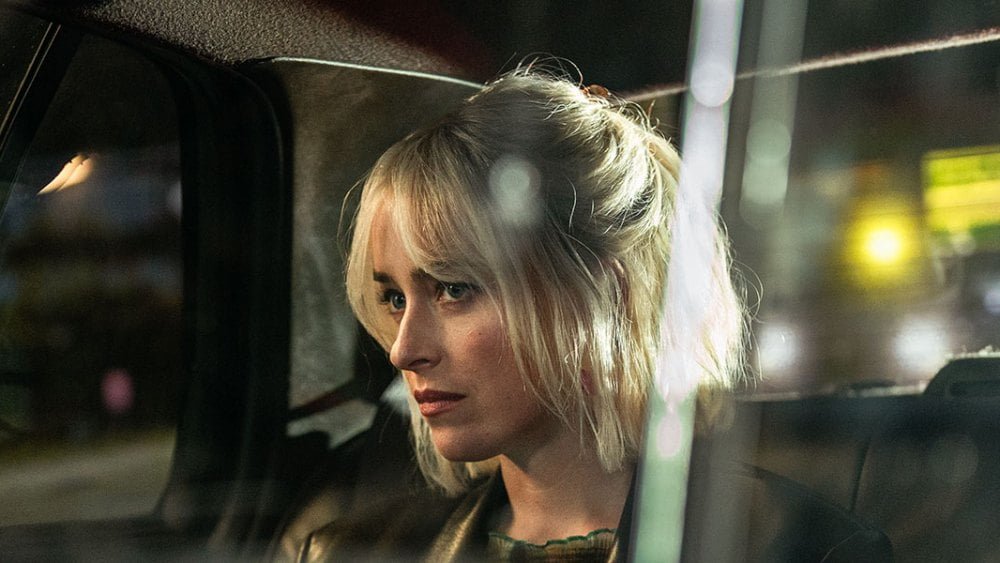‘Daddio’ Review: Sean Penn Takes Dakota Johnson for a Ride
[ad_1]
If the prospect of being stuck in a New York City taxi with two characters for roughly 90 minutes doesn’t sound like your kind of movie, then you’re seriously underestimating “Daddio” writer-director Christy Hall’s ability to keep you riveted for the entire ride. There’s a challenge you could give any first-time filmmaker: Using a yellow cab as the only location, make a film that challenges people’s expectations of how men and women relate to one another. The key, it turns out is casting (Dakota Johnson and Sean Penn bring “Daddio” to life), hiring a great cinematographer (Phedon Papamichael) and a whole lot of life experience.
The film begins when a blond woman (Dakota Johnson) lands at JFK airport, back from a trip that was neither business nor pleasure. Stepping into the first yellow cab, she glances at her phone, but strikes up a conversation with the driver, which takes audiences on a far different route than they might possibly have imagined. Much of the film’s suspense comes from the sheer pleasure of discovery. But it’s compounded by the obvious difference in age and gender: Will Clark (Penn), driving his last fare of the night, respect his passenger, or will he make some kind of predatory move on her?
Casting Penn brings an immediate tension to the dynamic, the way a child might feel trying to pet an unaccompanied pit bull. Penn’s an actor we associate with aggression and sex, so immediately, the mind races to where such a character might take a woman who, according to his own snap judgment, “can handle yourself.” Hall wants us to second-guess stereotypes — that’s one of the film’s key themes, as two strangers triangulate what they can about one another over a short span of time.
Acting like something between a detective and a therapist, Clark presses his passenger with questions. He fancies himself an expert on human nature, capable of extrapolating someone’s personality from just a few clues. Understandably wary, Johnson’s character resists telling him her name and age (“The moment you meet 30, your value cuts in half,” she fires back), but reveals where’s she’s from: a small town in the armpit of Oklahoma. That catches him off-guard. She looks more worldly than that. Meanwhile, she’s genuinely surprised when he guesses that she’s having an affair with a married man — an older man she’s been known to call “daddy.”
This unseen creep serves as a third character, his presence felt through a stream of lewd text messages. Exercising willpower, she does her best to ignore his demands, as he sends her a dick pic and asks for her to up the ante. She focuses instead on the slightly flirtatious game of getting-to-know-you that’s developing between the driver and her. The whole ride, she’s been pursing her lips and meeting his gaze in the rearview mirror in ways that some men might take as a come-on. Now the pair start to keep score, tallying up a point each time one of them says something that destabilizes the other.
For the first half of the trip, she’s on defense, answering his questions. But about halfway through, traffic grinds to a standstill, he slides open the window that separates them, and she starts to learn things about her interrogator. Clark admits to being married multiple times and comes clean his own infidelities, launching into an elaborate theory about the difference between men and women. “Men know how to do that,” he says, “probing around to see if there’s candy to get.”
Hall lobs these broad generalizations in a way that’s meant to tweak both her main character and the audience, but that doesn’t mean she believes them. In light of the parallel conversation unfolding on her phone — whose typo-ridden texts leave all but her lover’s anatomy to the imagination — there seems to be a secondary game afoot that Clark’s not aware of, as she tests his theories on her lover (including one about the word “love,” which Clark considers a dealbreaker in extramarital affairs). The very last volley in the couple’s text-based conversation could be fuel for endless debate.
Every aspect of “Daddio” is designed to spark conversation. But it’s sweeter and more satisfying than you might expect, especially as Hall pays off ideas introduced early in her script: There’s talk of tips, half-remembered handshakes, being tied up in bathtubs and trying to distinguish between true and false, all of which Hall cleverly circles back around to as the taxi reaches its destination. Even the silences are telling, and Johnson’s acting, which seemed slightly exaggerated early on, evolves into something incredibly nuaced toward the end.
Though “Daddio” might not sound cinematic enough to justify the trip to a movie theater, rest assured, not only has DP Papamichael taken care to make Hall’s debut feature look gorgeous, but the film benefits immeasurably from the undivided attention the big-screen experience demands, as well as the collective discomfort and nervous laughter of seeing with a crowd. The ride may only reach from JFK to Midtown, but in that span, it covers an awful lot of ground.
[ad_2]
Source link

